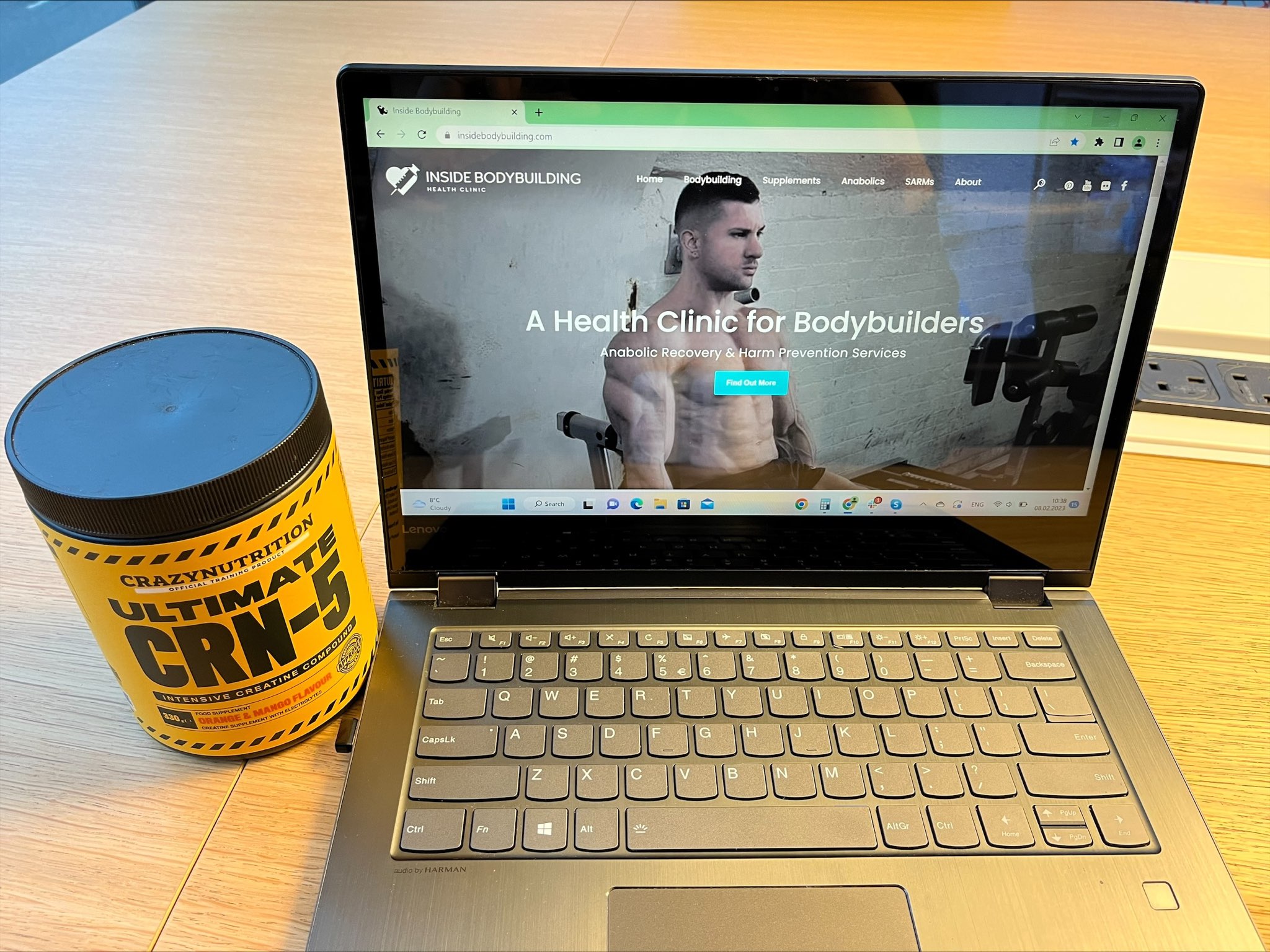Is Creatine Monohydrate Healthy? Read This Before Taking It.
Creatine monohydrate is the white, chalky powder that unaware newbies think is a steroid—but actually is an amino acid.
Steroid users might scoff at its muscle-building effects, but natural athletes hail it as one of the best supplements on the market.
Few people dispute creatine’s effectiveness, with it being a popular supplement since the late 1980s, marketed to increase ATP production inside the muscle cells, muscular strength, size, and endurance.
This increase in intracellular fluid shocks the muscles by enabling users to train at higher intensities while overloading the muscles with heavier weights and additional reps.
Our bodies naturally produce creatine; however, with effective supplementation, creatine stores can increase by roughly 20% inside the muscle cells (1). This effect may be even higher in vegetarians, with creatine being present in meat sources.
Creatine is available in food sources such as red meat, pork, and fish, albeit only in small quantities, hence why people opt for supplementation instead.
Contents
Is Creatine Monohydrate Healthy?
Many people only read studies when educating themselves on nutrition and supplements, which is a grave mistake.
I could cite endless studies proving the safety of creatine in the short and long term. However, you’d be foolish to only pay attention to studies without looking at real-life case studies. Supplement companies often back and fund research, which results in bias.
Also, “trusted authorities” making statements on certain supplements may also be taken with a pinch of salt. For example, the International Society of Sports Nutrition claims that creatine is safe and has no adverse effects (2). However, just from quickly looking at their website, you’ll see that some of their sponsors are supplement companies that sell creatine products (such as MuscleTech, Dymatize, and Creapure). Thus, if they came out and said anything different from this, they may lose sponsors and funding.

Therefore, the best way to find out if a supplement is safe is to test it out yourself while listening to other people’s experiences and reading through the studies loosely (as a guide).
My Experience With Creatine
I have tried various creatine supplements. I have tried CEE (creatine ethyl ester) in pill form and the classic monohydrate in powder form. I find that the standard monohydrate is the most effective version, producing noticeable gains in strength and size. In terms of brands, I have tried MyProtein and Beast’s Creature, which are both solid options.
However, I’ll no longer take creatine, and here’s why.
Despite countless studies repeatedly saying creatine causes no side effects, every time I take it, my body temperature increases and I experience shortness of breath. When I feel my pulse on creatine, my heart beats much harder than usual, indicating that it’s being strained.
Fitness forums are also flooded with people who have noticed the same, with some of them getting their blood work done before/after creatine supplementation.
Creatine Complaints
I Stopped Taking Creatine and Blood Pressure Went Down

Blood Pressure Up

I am Through With Creatine

Blood Pressure Through the Roof, Then Drops After Coming Off

Blood Pressure Increase After Taking Creatine

Doctor Says Creatine Might Be the Culprit

Blood Pressure a Lot Higher


Kidney Dysfunction and Blood Pressure Skyrocket

Unfortunately, I’m sure there are many more people who have experienced negative reactions that haven’t posted on forums. I have not measured my blood pressure before/after to see the difference when I’m on creatine; however, I have symptoms of high blood pressure each time I supplement with it.
Some people might say that it may be something else giving you these side effects or an increase in blood pressure; however, this happens every time I take the supplement. Then, when I discontinue, the side effects go away. Scientifically, it would make sense that creatine may cause a significant increase in blood pressure because it causes substantial amounts of water retention (like salt). Research has shown that creatine can increase water weight by up to 6 pounds (3). That’s roughly an extra 3 liters of water held by your body.
It’s well known that water retention increases blood pressure, while diuretics decrease it. This is because your blood contains water, and when you retain more H2O, the blood becomes more viscous. This makes it increasingly difficult to flow to and from the heart, causing your heart to pump harder to improve circulation.
Interestingly, many creatine users report symptoms of high blood pressure, such as headaches, clenched teeth, and the rushing of blood to the head.
Not Drinking Enough Water?

Some people say creatine may spike blood pressure in those who don’t drink enough water, via dehydration. Research suggests dehydration can result in high blood pressure (4).
By drinking more water, you will flush excess water out of your body. Thus, by reducing water retention, you may improve your blood pressure; however, if you do this in excess, your strength and muscle gains will also decrease, as water retention is needed for creatine’s benefits.
However, there is a problem with drinking large amounts of water on creatine. Although we recommend everyone drink enough water on creatine to stay hydrated, if a person’s blood pressure is already spiked, then they consume large amounts of water, and their blood pressure may worsen. This is because water is known to stimulate the central nervous system and constrict blood vessels (5). This effect is minor and barely noticeable; however, when consuming water in large quantities, it can be enough to place extra strain on the heart.
Thus, drinking water may not be the solution to correcting your blood pressure if it’s spiked from taking creatine, and it may even exacerbate cardiovascular symptoms.
What the Studies Say
Since the 1990s, when creatine first came on the scene, it’s become one of the world’s most tested supplements.
3 decades later, all research on the supplement points to the same conclusion: that it poses no adverse effects.
This is despite many people initially saying it was “dangerous” when it first came onto the market.
Here are numerous studies suggesting that a) creatine is safe and b) it may even improve some aspects of your health.
- Brazilian researchers saw a slight decrease in blood pressure in participants taking 20 grams of creatine for a week. The average age of the men was 28 (6).
- There is evidence that creatine lowers blood sugar levels (7).
- A 4-year study on 26 athletes showed no adverse effects (8).
Despite these studies, the FDA has received more than 30 complaints regarding creatine, with people reporting seizures, unstable heartbeats, and even death. The FDA, however, has rejected creatine as the cause (9). People have also reported cramping, diarrhea, and stomach issues. It cannot be proven that creatine was the cause of all these problems; however, experts have called for more long-term studies to be conducted.
Is Creatine Worth It?

The studies suggest creatine is safe to take, and it’s true that some people notice little in regards to side effects; however, others (like myself) notice plenty.
Although clinical research claims it is generally safe (at the moment), there’s no guarantee that it is safe for you to take.
It seems dubious that a notable number of people are complaining about creatine’s side effects, yet you’d struggle to find a single study that mimics such negative reactions.
It’s important to note that studies are not always trustworthy or 100% accurate, with potential financial gains to be made for companies funding the studies.
There’s ample evidence that certain people are more sensitive to creatine and may respond badly to it. Insulin sensitivity can affect its absorption; thus, two people may take 10 grams, but one may end up with less in their bloodstream than the other person once it bypasses the liver.
One theory is that if a person absorbs a large amount of creatine (due to increased insulin levels), they may be more susceptible to side effects. Taking creatine with a sugary drink such as grape juice, plus genetics, can also affect absorption. Thus, if you do take creatine, make sure you regularly monitor your blood pressure and if you experience any unpleasant side effects, be sure to visit your doctor or discontinue supplementation.
If you have existing blood pressure, previous heart disease, or kidney problems, it may be wise to avoid creatine altogether. It’s not worth jeopardizing your health for a few extra pounds of muscle mass.
Have you tried creatine before? If so, let us know via our contact page if you experienced any side effects.
References
(1) https://www.ncbi.nlm.nih.gov/pubmed/8828669
(2) https://jissn.biomedcentral.com/articles/10.1186/1550-2783-4-6
(3) https://www.ncbi.nlm.nih.gov/pubmed/9475647
(4) https://www.meridianvalleylab.com/dehydration-shown-to-increase-blood-viscosity/
(5) https://www.ncbi.nlm.nih.gov/pubmed/15683582
(6) https://nutritionj.biomedcentral.com/articles/10.1186/1475-2891-13-115
(7) https://www.ncbi.nlm.nih.gov/pmc/articles/PMC2048496/
(8) https://www.ncbi.nlm.nih.gov/pubmed/11224803
(9) https://apnews.com/article/91c2bb4deed8d521064dd075bbac71c7
Inside Bodybuilding is a team of medical professionals and physicians with specialized knowledge and experience regarding bodybuilding and PEDs.



